ROBERT HOOKS
Robert (Bobby Dean) Hooks
by Dale Ricardo Shields
American actor, producer, and activist. Along with Douglas Turner Ward and Gerald S. Krone, he founded The Negro Ensemble Company.
The Negro Ensemble Company is credited with the launch of the careers of many major Black artists of all disciplines, while creating a body of performance literature over the last thirty years, providing the backbone of African-American theatrical classics.
Additionally, Hooks is the sole founder of two significant Black theatre companies: the D.C. Black Repertory Company, and New York’s Group Theatre Workshop.
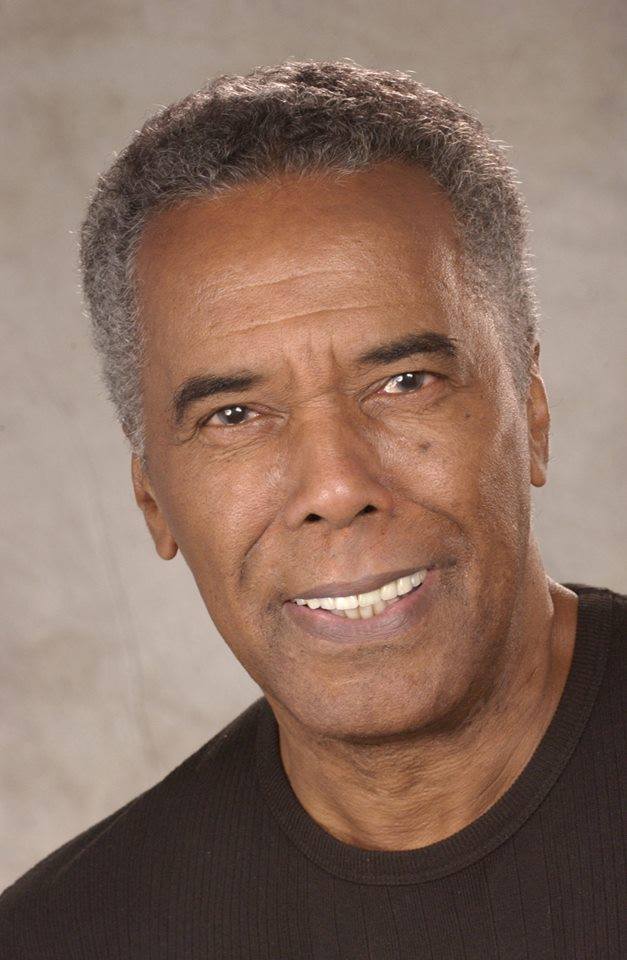
In 2021, Emory University began adding to its official archives material documenting Hooks’ career, including scripts, printed material, contracts and financial records, notes, correspondence, writings, books and periodicals, audiovisual and digital files.
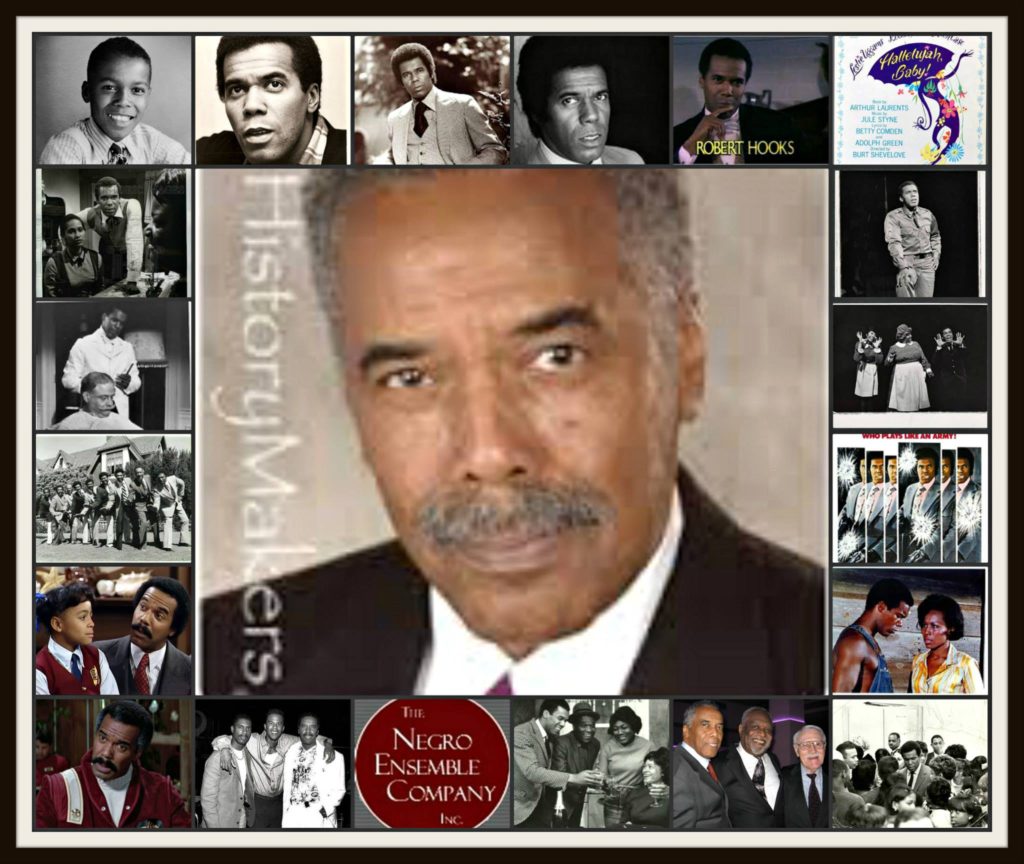
Graphic by Dale Shields
Born Bobby Dean Hooks into the rat-infested Foggy Bottom of segregated Washington, DC in 1937, a product of the post-Depression Northern Migration, the story of Robert Hooks’ life, in many ways, characterizes the turbulent growing pains of an America which are still struggling to come to terms with its racial history.
Robert Hooks has had a distinguished career as an actor, producer, and political activist. A celebrated and recognizable performer who was repeatedly chosen to break the color barrier in all media before the term “colorblind casting” even existed, Mr. Hooks was instructed by the Rev. Dr. Martin Luther King, Jr. to never forget that artists were an integral and vital part of the struggle for civil rights. That mandate has shaped his existence and career.
He has founded three significant Black theatre companies: New York’s Group Theatre Workshop, the post-riots DC Black Repertory Company in his hometown, and the internationally recognized Negro Ensemble Company. Born as a consequence of Hooks’ first producing venture—a double-bill of Douglas Turner Ward’s Happy Ending and Day of Absence—the NEC was the most important enterprise of its kind, launching the careers of many of our major Black artists in all disciplines.
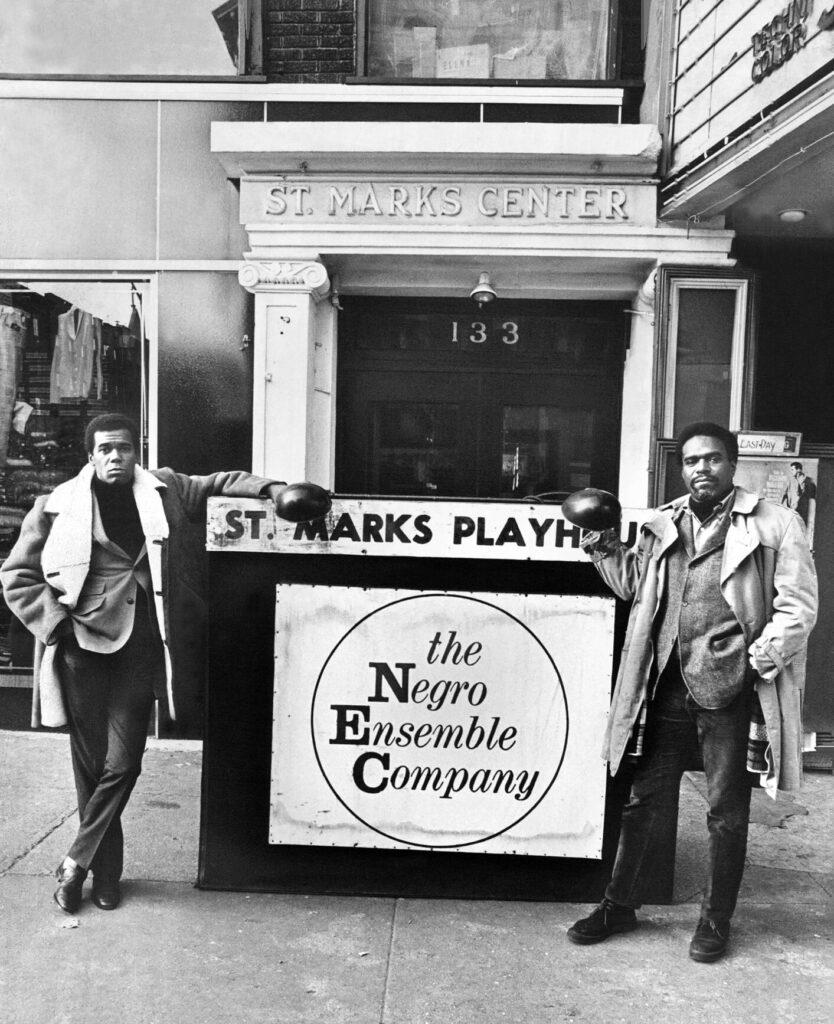
Robert Hooks and Douglas Turner Ward
“My mother remarried in 1954, and we moved to Philadelphia and I went to my first integrated high school: West Philadelphia High School, where I really started acting. Philadelphia was a tryout town for Broadway, and I would go see these plays. Most of the plays I saw were all White plays with no Black characters. But then came “A Raisin in the Sun” on its way to Broadway. It blew my mind. I was in tears just wanting to be on that stage because it had Sidney Poitier, Ruby Dee, Claudia McNeil, Diana Sands, Ivan Dixon, and Louis Gossett Jr. — they were all there. I made up my mind. I wanted to be a professional actor. Instead of going to Temple University, a few months later I was in New York.
I replaced Lou Gossett in the play, and I met Douglas Turner Ward and Lonnie Elder, who were actors but mainly playwrights. So I met these guys as they were writing plays while we went on the road on the national tour. That’s how I really got into understanding the structure of theater and the structure of plays and what made them work. That’s where the whole idea of bringing theater to the Black community came from — in every city that we went, Black people who had never seen a Black play came and were just so enthusiastic. We saw the potential of Black audiences in every city.” – WASHINGTON POST [ Roxanne Roberts 2018]
Robert Hooks-Vintage Reel of an American Cultural Architect
A vintage highlight reel examining the career of Actor/Producer/ Director and co-founder of the internationally esteemed Negro Ensemble Company Robert Hooks. From stage to screens large and small this is a vivid look at a man who broke color barriers, helped change the racial makeup of American arts, and – politically -worked in front and behind the scenes to enlarge and then protect those rights of access.
Robert Hooks – More Than Myself
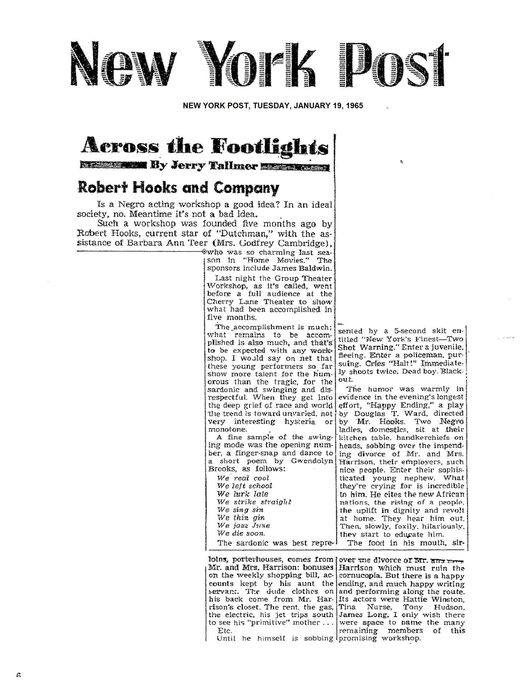
“And the children shall lead them!”…And they did! On this special night at the Cherry Lane Theatre in 1965 when I directed them in Douglas Turner Ward’s “Happy Ending.” In the very first public showcase performance of my very first arts group – The Group Theatre Workshop (GTW) named an homage to Harold Clurman’s Group Theatre. Here is the review from one of New York’s top drama critics Jerry Talmer. Reading that gorgeous little review of GTW’s teenage thespians began brainstorms raging in my mind. I immediately decided to buy the option from Doug and personally produce his brilliant one-acts “Happy Ending” and “Day of Absence” professionally! Ten months later, raising all Black financing, I did just that. The plays were a smash hit and Doug became the anointed premier Black playwright, stealing that thunder from LeRoi Jones (aka Amiri Baraka) and his current hit “Dutchman”! (Since only ONE black playwright could be allowed through at a time.) And all because 30 young, aspiring theatre artists (straight out of my converted apartment living room) showed out in performance! The birth of our Negro Ensemble Company came soon after! And the youngster’s GTW was folded into the NEC as the nucleus of its tuition-free training program!“
It’s nurturing of Black playwrights over the course of three decades created a body of performance literature that comprises the backbone of the African-American theatrical canon and provided nuanced vehicles for Black performers until August Wilson picked up the baton.
As a young actor in Philadelphia, it was seeing A Raisin in the Sun in tryouts both stunned and awakened him to what was possible.
Almost immediately, he packed his bags and moved to Manhattan where, in a scene reminiscent of a 1930s Stage Door musical, he was soon hired for that same original Broadway production A Raisin in the Sun!
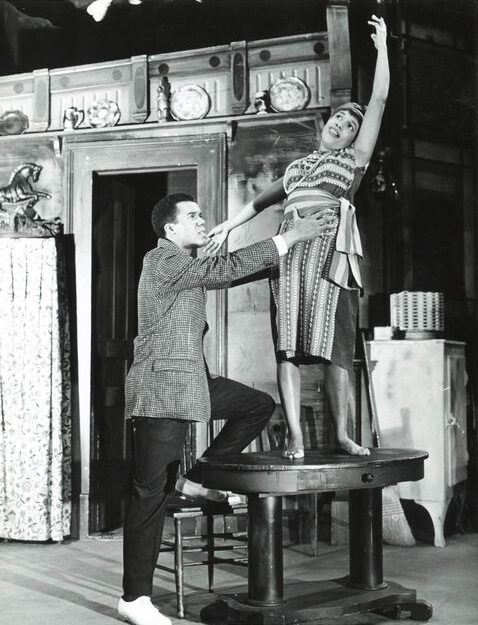
It was 1960, I had moved up to New York after seeing this incredible play “A Raisin in the Sun” while studying theatre in Philadelphia. Sitting in the audience getting my mind blown away, I remember thinking “I sure wish I was up on that stage with these brilliant Black performers”. Sidney Poitier, Claudia McNeil, Ruby Dee, Diana Sands, Louis Gossett, Ivan Dixon, Lonne Elder III, and a very young Glynn Turman. Well, guess what! That play convinced me to pack up and move to Gotham to become a professional actor. By then Raisin was a big smash Broadway hit. As fate would have it, my very first professional acting job was replacing Louis Gossett on Broadway in the play which prompted me to move to New York in the first place!… Seen here is Diana Sands as Beneatha and me as George Murchison! This is the play that started it ALL, for me, and the 1960’s Black theatre movement!
He then segued into the lead role in Jean Genet’s long-running, politically incendiary play The Blacks (alongside Maya Angelou, Roscoe Lee Browne, Cicely Tyson, James Earl Jones, Louis Gossett, Adolph Caesar, Raymond St. Jacques, Charles Gordone, and Godfrey Cambridge), followed shortly afterward by inaugurating the male lead in Leroi Jones’ provocative two-character piece, Dutchman produced by Edward Albee. The next decade brought a series of Broadway shows, among them Arturo Ui, The Milk Train Doesn’t Stop Here Any More, A Taste of Honey, and Hallelujah Baby, for which he garnered a Tony nomination for Lead Actor in a Musical.
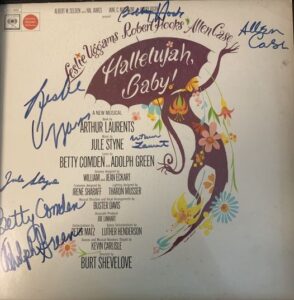
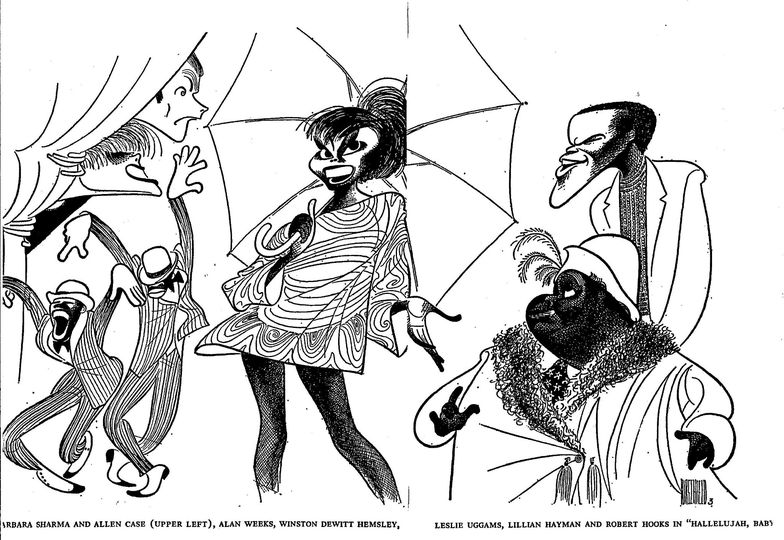
“1967! co-starring with the lovely, ultra-talented Leslie Uggams in the Broadway musical hit ‘Hallelujah Baby’ the New York Times presented this ‘Hirschfeld’ caricature in the Sunday Drama section saluting the cast. (left to right) Barbara Sharma and Allen Case, dancers Allan Weeks and Winston Dewitt Hemsley, Leslie Uggams, Lillian Hayman, and Robert Hooks, with the very long chin!“
“This is ‘A Hirschfeld’ caricature, and it’s kind of an honored Broadway tradition for an actor (usually in a Broadway musical) to be the subject of a Hirschfeld. The artist Hirschfeld would choose a play and it’s performers that’s up for the annual prestigious Tony Award and feature the artwork in the Sunday New York Times drama section. I know my dear friend the talented Broadway star Melba Moore has hers, and she knows what an honor it is to have a Hirschfeld. And of course, there are other recipients. (But be aware!) The artwork ALWAYS has Hirschfeld’s signature in the lower right corner and also has the number of times his daughter NINA’s name appears in each caricature offering (in this one there are three NINA’s). If those things aren’t on the artwork, it is not an authentic Hirschfeld. And by the way, I was never that impressed with my caricature in this Hirschfeld..But I’ve accepted it with good humor!”
Off-Broadway he broke theatrical color barriers when Joseph Papp cast him in the title role of Henry V, a first in theatre history.
In television, the groundbreaking David Susskind-produced N.Y.P.D. was the first prime-time network drama to feature a Black male lead. In addition to two highly acclaimed mini-series, Backstairs at the White House and Sophisticated Gents, Robert has appeared in over 150 productions for the small screen. And when television producers realized that John F. Kennedy’s book Profiles in Courage had no Black heroes it was Robert they invited to star in the hastily added episode Young Frederick Douglas. Films have included Otto Preminger’s Hurry Sundown, Tennessee Williams’ Last of the Mobile Hotshots, Passenger 57 (directed by his son Kevin Hooks), Star Trek III, and the title role in the uncomfortably political cult hit Trouble Man, making him the original “Mr. T.”
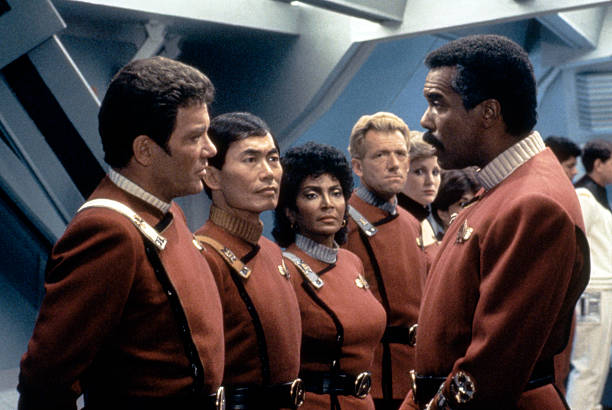
Canadian actor William Shatner, American George Takei, Nichelle Nichols, and Robert Hooks on the set of Star Trek III: The Search for Spock, directed by Leonard Nimoy. (Photo by Paramount Pictures/Sunset Boulevard/Corbis via Getty Images)

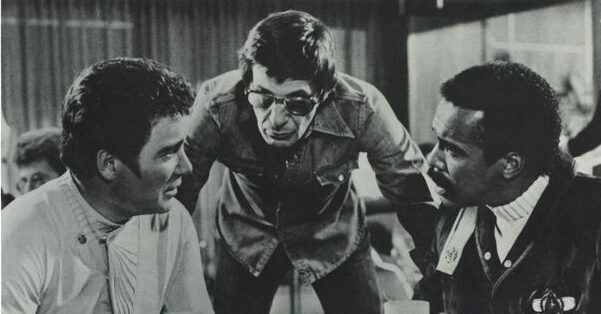
“Star Trek III, Search for Spock“, was a ton of fun to work on! I had no idea I’d enjoy it as much as I did!… Here, in a rehearsal confab is Leonard Nimoy (who directed the movie) and star William Shatner! Of course, the most fun of all was working with my longtime friend and brilliant artist Nichelle Nichols!
His active stance in politics cost him some jobs but engendered continuing requests for him to speak publicly. He’s been invited to speak in front of the House-Senate Committee both on his own and, in 1973, in the company of Sidney Poitier, Maya Angelou, Brock Peters, Bernie Casey, and Terry Carter regarding the National Foundation on the Arts and the Humanities Act. He served as the opening speaker for then-President Bill Clinton and was feted by future AMPAS President Jack Valenti at the Nixon White House.
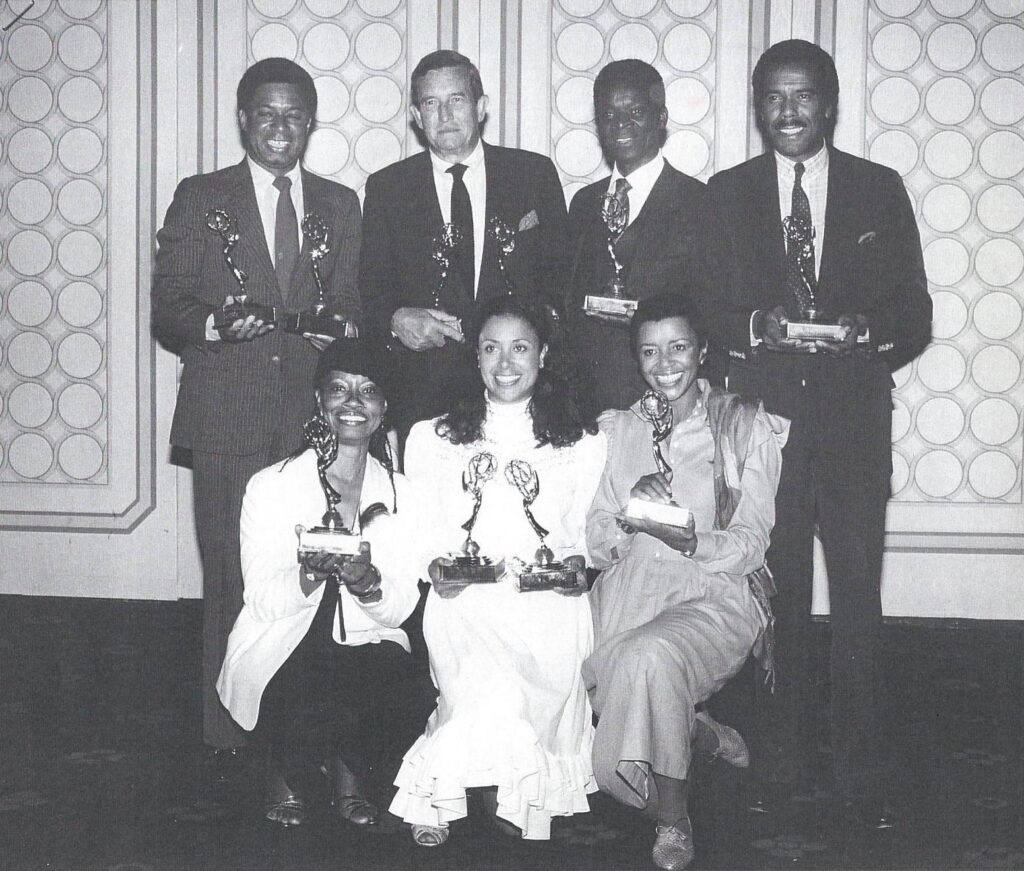
“Centered in Los Angeles (circa 1979) “The Media Forum” group focused on such issues as employment, media ownership, and elimination of stereotypes in America’s entertainment industry. The Media Forum’s primary strategy was to hold a series of public meetings with leaders from the government and media pursuing and advocating a leveling of the media playing field for artists of color. A performing arm of the company was formed to create a touring theatre of classic Black poetry, performances for college and high school students around the state-sponsored by the California Department of Education. We entitled the show “Voices of Our People” and we were in demand across California’s education system. PBS produced a TV special on Voices of Our People and the show won a series of Emmys. Here, celebrating winning their statues are six Media Forum founders who were the performers of Voices: (standing L to R) Charles Floyd Johnson, producer Jim Washburn, Brock Peters and Me, (in front) Tracee Lyles, Denise Nicholas, and Janet MacLaughlan. The Media Forum’s advocacy had serious beginning effects on important changes in hiring practices for people of color at the networks and the Hollywood studios.”
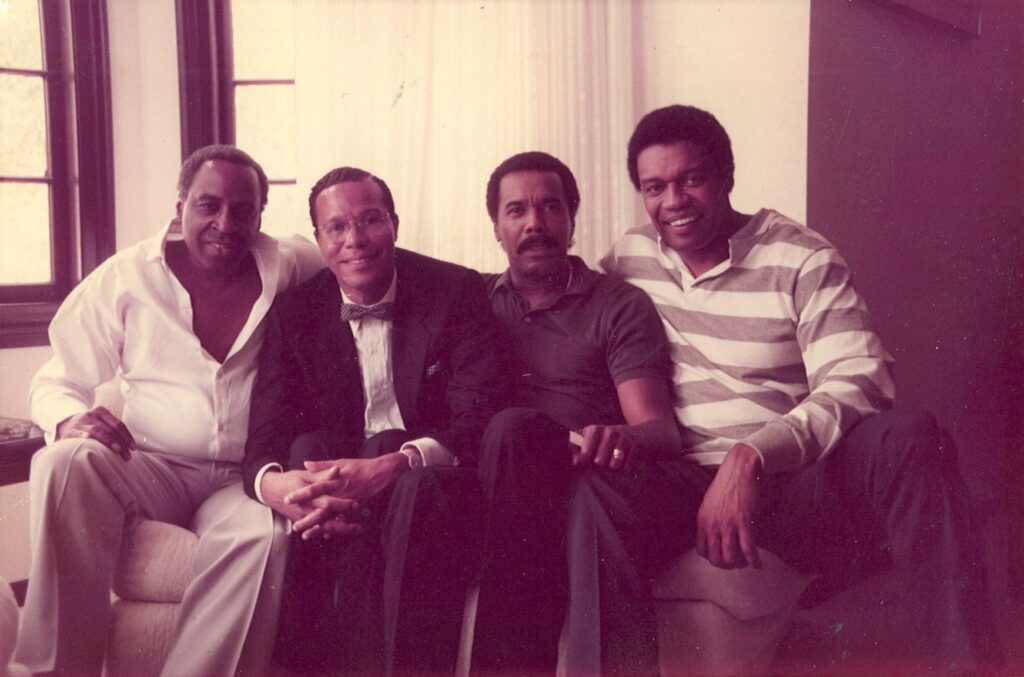
BLACK THEATRE PIONEERS
“1978 Strategy session with three Founders of The Media Forum,(a professional artists media advocacy group hosting honored guest and Media Forum supporter and adviser the Honorable Minister Louis Farrakhan at the home of writer Lonne Elder III. …From left to right: Robert Guilliame, Minister Farrakhan, Robert Hooks, and Bernie Casey. The Media Forum was responsible for effectively pressuring the studios and the networks to begin leveling the playing field for Black artists in front of and especially behind the cameras in the entertainment industry front offices in decision-making capacities.”
Widely recognized for his contributions to theatre, film, and television, Mr. Hooks has won a Producing Emmy Award for his PBS special Voices of Our People; a New York Drama Critics Award for A Raisin in the Sun, and the World Annual Award for Where’s Daddy? He has been nominated for a Tony for his lead role in the musical Hallelujah, Baby, and has also been presented with both the Pioneer Award and the NAACP Image Award for Lifetime Achievement and has been inducted into the Black Filmmakers Hall of Fame.
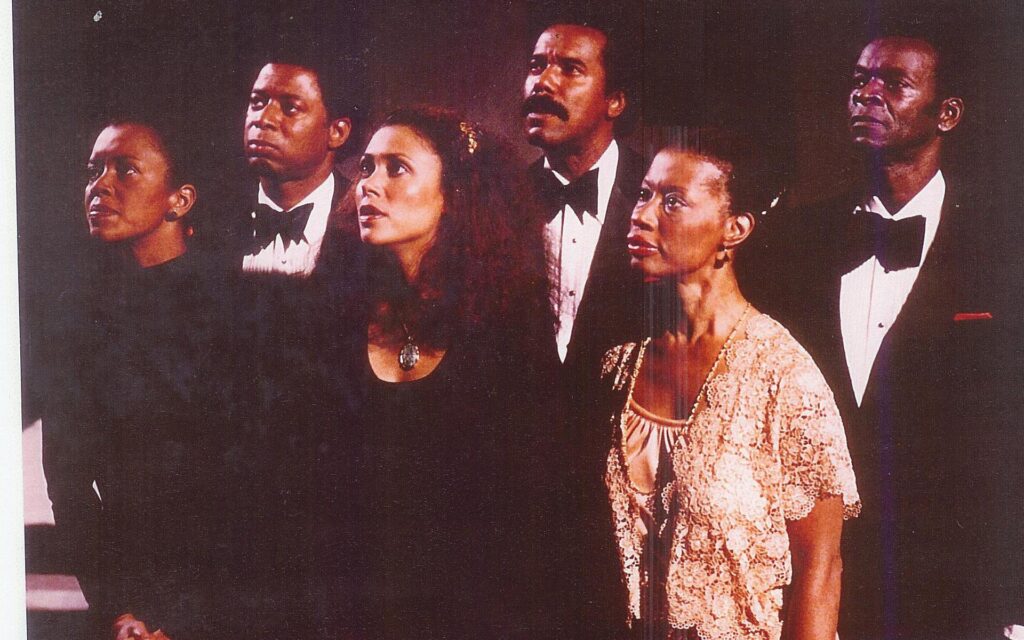
“Here’s a classic throwback image of the founders of ‘The Media Forum’, from the Emmy Award-winning PBS/KCET television presentation “Voices Of Our People, In Celebration Of Black Poetry” (circa 1981.) Ladies in front: (left to right) Janet MacLaughlan, Denise Nicholas, and Tracy Lyles- Men in back: Charles Floyd Johnson, Me, and Brock Peters. The Media Forum organization advocated for more and better opportunities for Black artists and other professionals of color, in front of and behind Hollywood’s film and TV cameras!”
To cite Herbert Allen, a Chicago-based television producer, in his paper, Robert Hooks: Intergenerational Visionary & Institution Builder, written in 2007 on the occasion of yet another Lifetime Achievement Award:
“It is time to acknowledge Robert Hooks as a resource of guiding vision for the African American presence in theater, now and in the future. Contemplating the philosophical and sociopolitical underpinnings of Hooks’ gift and commitment to institution building, and revisiting Hooks’ accomplishments, it becomes clear that he should be actively treasured as a resource today. His is the kind of historic vision that informs the present and gives direction for the future.“
“I’ve done eight Broadway shows. You will never meet an actor who has done eight Broadway plays. I was doing play after play; Tennessee Williams…. I was being directed by the greats. When a role came up, producers would say, “Can we get Robert Hooks for this?” I was very fortunate. I was the busiest actor in New York City; this is just how it went down for me.”
